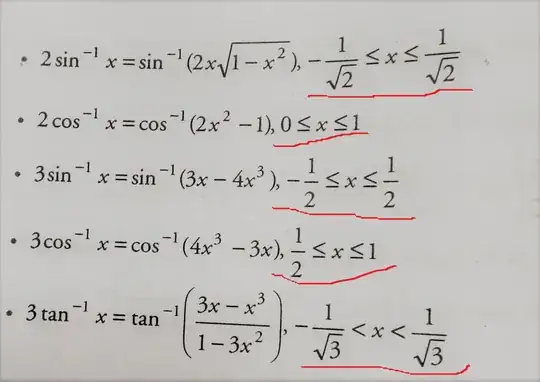In order to compute $\arcsin(2x\sqrt{1-x^2})$, you need that
$$
\bigl|2x\sqrt{1-x^2}\,\bigr|\le 1
$$
which becomes
$$
4x^2(1-x^2)\le 1
$$
and therefore
$$
4x^4-4x^2+1\ge0
$$
Since the left-hand side is a square, the inequality is satisfied for every $x$, provided $1-x^2\le1$. This is equivalent to $-1\le x\le 1$.
You are misreading the assignment, which asks you to prove that, for $|x|\le1/\sqrt{2}$, you have
$$
2\arcsin x=\arcsin\bigl(2x\sqrt{1-x^2}\,\bigr)
$$
Note that this doesn't hold, for instance, when $x=1$, because the left-hand side is $\pi$, whereas the right-hand side is $0$.
Set $\alpha=\arcsin x$. Since we're assuming $|x|\le 1/\sqrt{2}$, we have $-\pi/4\le\alpha\le\pi/4$. Therefore $\cos\alpha=\sqrt{1-\sin^2\alpha}=\sqrt{1-x^2}$. Then
$$
2x\sqrt{1-x^2}=2\sin\alpha\cos\alpha=\sin2\alpha
$$
Since $-\pi/2\le 2\alpha\le \pi/2$, we have
$$
\arcsin\bigl(2x\sqrt{1-x^2}\,\bigr)=
\arcsin\sin2\alpha=2\alpha=2\arcsin x
$$
as required. The other questions are similar.
With more advanced tools. Let $f(x)=\arcsin\bigl(2x\sqrt{1-x^2}\,\bigr)$. Then
$$
f'(x)=\frac{1}{\sqrt{1-4x^2(1-x^2)}}
\left(2\sqrt{1-x^2}+2x\frac{-x}{\sqrt{1-x^2}}\right)
=\frac{1}{|1-2x^2|}\frac{2(1-2x^2)}{\sqrt{1-x^2}}
$$
This coincides with the derivative of $g(x)=2\arcsin x$ only for $1-2x^2>0$, that is, $-1/\sqrt{2}<x<1/\sqrt{2}$.
Since $f(0)=g(0)$, the two functions are equal only on the interval $[-1/\sqrt{2},1/\sqrt{2}]$ (at the extremes by continuity).
You can also say that
$$
\arcsin\bigl(2x\sqrt{1-x^2}\,\bigr)=
\begin{cases}
c_1-2\arcsin x & -1\le x<-1/\sqrt{2} \\[4px]
2\arcsin x & -1/\sqrt{2}\le x\le 1/\sqrt{2} \\[4px]
c_2-2\arcsin x & 1/\sqrt{2}<x\le1
\end{cases}
$$
and you can easily determine the constants $c_1$ and $c_2$ by using continuity or by using that $f(-1)=0$ and $f(1)=0$.
